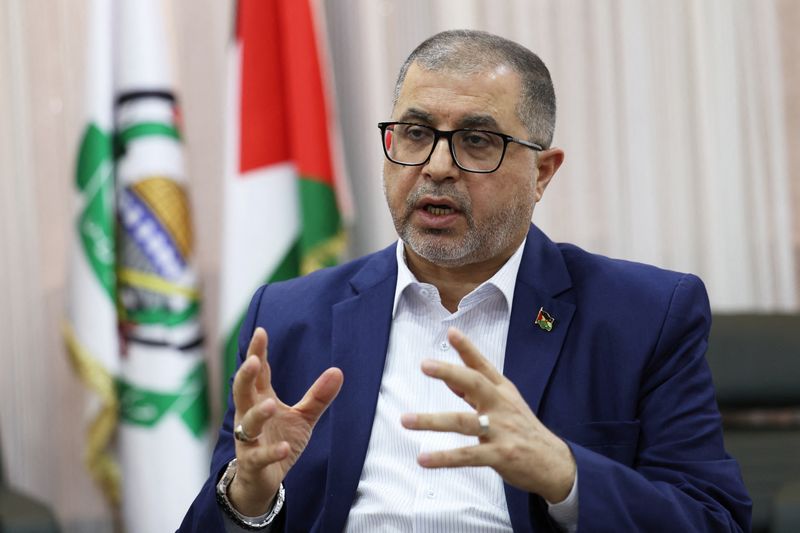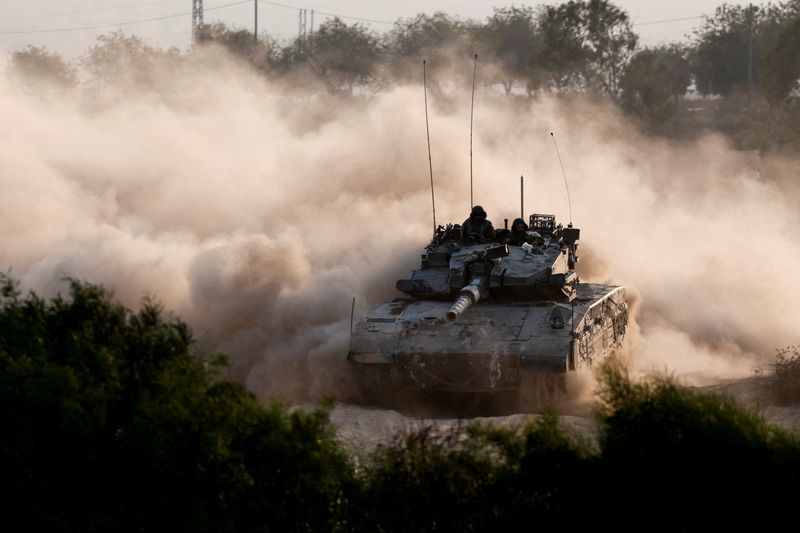By Jonathan Spicer
ISTANBUL (Reuters) - Any solution to the rapidly expanding regional conflict that has spread to Lebanon and beyond hinges on a resolution of the original crisis in Gaza, a senior Hamas official said on Wednesday.
With the war in Gaza now in its second year, fighting has flared in southern Lebanon, where Israeli troops are now facing Iranian-backed Hezbollah militia fighters on the ground, and risks escalating into a full-scale conflict with Iran.
Diplomatic efforts to halt the fighting have stalled and attention is now focused on an expected Israeli strike on Iran after Tehran launched its second missile attack on Israel more than two weeks ago.
"It is so complicated and intermingled, the two fronts, that it is not easy to reach a permanent ceasefire or permanent solution to this conflict without solving the original one, which is in Gaza," Basem Naim told Reuters in Istanbul.
The comments underline how hard it will be to resolve a war that also involves the Iranian-backed Houthi movement in Yemen and now threatens to draw in the United States, which this week sent a missile defence battery to Israel.
The Gaza war erupted after Hamas-led gunmen attacked Israel on Oct 7, 2023, killing some 1,200 people and taking more than 250 hostages into the Palestinian enclave, according to Israeli tallies. Israel's campaign in response has killed more than 42,000 people, Gaza authorities say, turning much of the enclave into rubble and displacing most of its population.
Israel has vowed to destroy Hamas as a military and governing power in Gaza, while Hamas, including its elusive leader Yahya Sinwar, remain committed enemies of Israel.
'NO CALM' EVEN WITH LEBANON CEASEFIRE
Hezbollah, which fired its first barrage against Israel immediately after the Oct 7 attack in solidarity with Hamas, has recently begun to talk about a possible ceasefire, but Naim said that would still leave the wider question unresolved.
"Even if they reach a ceasefire for Lebanon, there will be no calm in the region (because) they are not talking about solving all these questions related to Lebanon or Palestine," he said.
Qatari and Egyptian-brokered efforts to agree a halt to the fighting and a return of the Israeli hostages have gone nowhere, with both Israel and Hamas blaming each other for the deadlock.
Naim said the mediators were "disappointed" by the expansion of the conflict beyond Gaza's borders but again blamed Israel for the failure of the talks.
"We cannot simply start negotiating new conditions added by (Israeli Prime Minister) Benjamin Netanyahu," he said.
Israel has vowed to dismantle Hamas' military and governing capability but has not appeared to be close to completing its campaign in Gaza, where it launched a major push in the northern part of the enclave two weeks ago.
Naim said the latest Israeli offensive in northern Gaza amounted to a "very tight, suffocating siege" unlike others.
"It is much more brutal and aggressive (than previous operations). It is directly targeting the civilian residential houses and homes," he said.
Israel says its troops have killed dozens of Hamas fighters over recent days in the operation but there has been growing international alarm at the humanitarian situation facing Palestinians, with the United States urging Israel to ensure more aid gets through.

However Naim said U.S. calls for more aid were not consistent with its overall support for Israel.
"How can one understand that at the same time that the Americans are calling for more aid and humanitarian relief, they are sending billions and billions of dollars and ... explosive materials and weapons, and (using) their veto each time in the UN Security Council to block the international will," he said.
